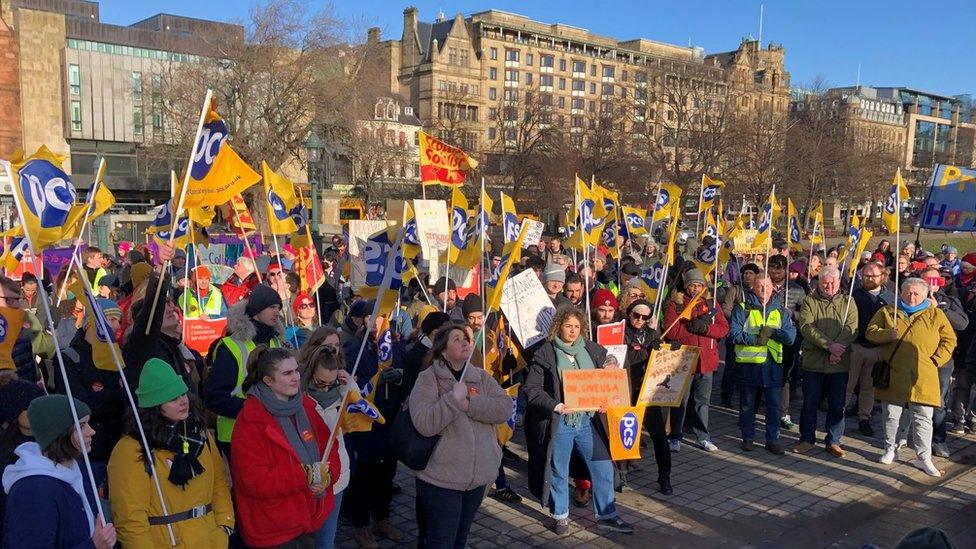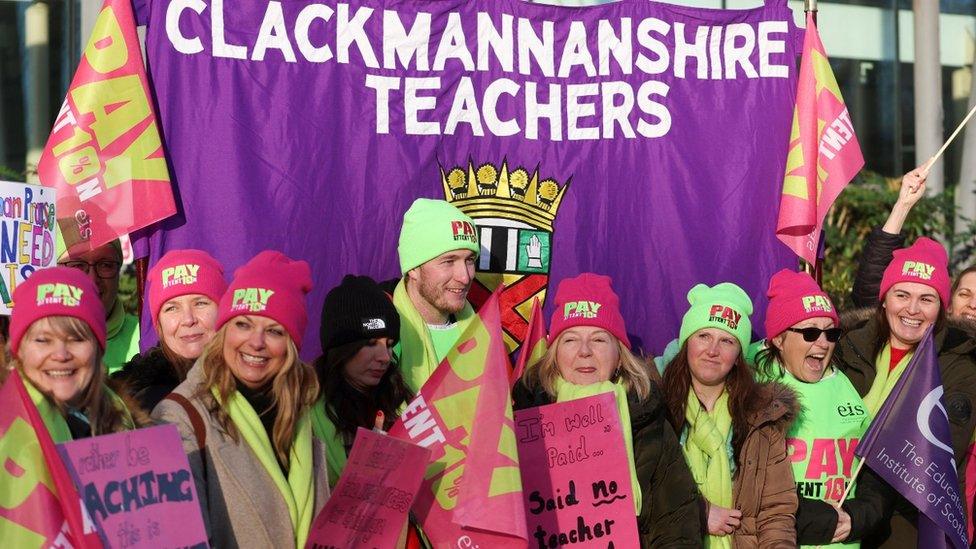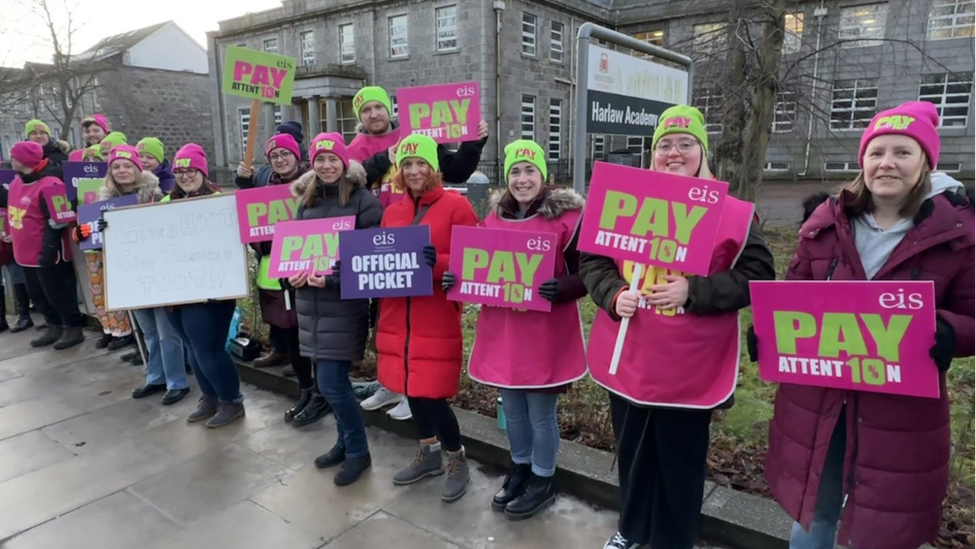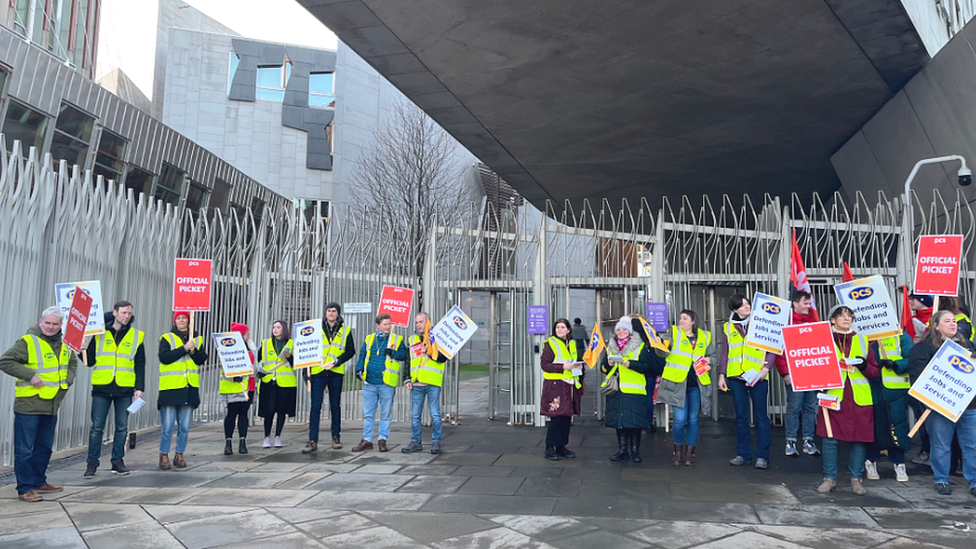Thousands of Scots workers join UK-wide day of strikes
- Published
- comments

Workers gathered at a rally at The Mound in Edinburgh to protest against the government's new legislation to limit strikes
Thousands of workers across Scotland are striking as part of a UK-wide day of industrial action.
Civil servants, higher education staff and some rail workers have joined teachers in what has been described as the biggest day of co-ordinated strikes in decades.
It comes in response to UK government legislation which will seek to limit strike action.
The move would also allow employers to put in place minimum levels of service.
Around 100,000 civil servants walked out across the UK for one day of action across most government departments, the PCS union said.
This included staff working at the Scottish Parliament in Edinburgh, with their action leading to the Holyrood building being closed to visitors.
Some MSPs also refused to attend parliamentary business during the strike, while courts and tribunals have also been disrupted.
Lynn Henderson, Scottish secretary of the PCS, told the BBC's Good Morning Scotland programme: "These are ordinary workers who work in passport offices, government offices, museums, galleries, courts, prisons. They are asking for a cost-of-living pay increase."
Ms Henderson said the UK government had offered 2%, "the lowest offer in the entire public sector", which was "just not affordable."
"There is a massive gap between 2% and 10%," she added.

Teachers in Alloa, Clackmannanshire, also made their stance clear about the impasse on a pay deal
Higher education workers also walked out as part of their ongoing dispute over pensions, pay and conditions.
Members of the University and College Union (UCU) at the majority of Scotland's universities also took part.
School strikes continued in Clackmannanshire and Aberdeen as part of the 16-day rolling strike action by the EIS union.
The union says there have still been no constructive talks on pay, with the Scottish government maintaining that the demands of 10% are "unaffordable".

Striking teachers outside Harlaw Academy in Aberdeen
Edward Aldred-Dow, a teacher at Harlaw Academy in Aberdeen, told BBC Scotland that union members were striking "for the right reasons".
"We've been overworked and underpaid for as long as I've been in the profession, which is 10-plus years now," he said. "I'll be on strike every day until we get what we deserve."
Some train company workers have also walked out, affecting a small number of services to Scotland.
Train drivers in Aslef and the Rail, Maritime and Transport union (RMT) are embroiled in a long-running dispute over pay and conditions.
LNER is running a limited service from Edinburgh south of the border, but no trains will run any further north than Edinburgh.
Avanti West Coast has advised customers not to travel on Wednesday or Friday.
However, ScotRail says services will not be affected on Wednesday.
David Simpson, ScotRail service delivery director, said: "The dispute between the trade unions and other train operators does not involve any ScotRail staff, which means ScotRail services will operate as normal on Wednesday and Friday."


Walkout Wednesday? A new winter of discontent? Whatever you call it, this is the biggest day of industrial action in decades.
Trade unions may have fewer members than they did in their heyday, and legislation makes it harder for them to take co-ordinated action, but they can still pack a punch.
According to official statistics, union membership peaked in 1979 at 13.2 million members but had fallen to 6.4 million by 2021, external despite population growth over the period.
Since 1995, the proportion of employees who are members of a union dropped from around a third to below a quarter.
But membership tends to be higher in the public sector which is where we have seen much of the impact, driven, say trade unionists, by the struggles of ordinary working people to feed their families and heat their homes.
The fact that inflation remains near a 40-year high is probably the most important factor behind the current industrial strife.
And although pay has been rising at its fastest rate in more than 20 years, it is still failing to keep up with the rapidly rising cost of living.

Wednesday's national day of action, which includes around 50,000 workers across Scotland, will culminate in a Right To Strike rally organised by the Scottish Trades Union Congress (STUC).
It will be addressed by SNP's Westminster leader Stephen Flynn, Scottish Labour leader Anas Sarwar and STUC general secretary Roz Foyer.
Rallies were also taking place in Glasgow, Edinburgh and Dundee throughout the day.
The PCS and other unions held a rally in Edinburgh just after midday, with several hundred gathering at The Mound to hear speeches from union leaders.
Members of the EIS, PCS, UCU and Unison unions were among hundreds of people who gathered for an event on Buchanan Street in Glasgow.
'Heavy heart'
Ms Foyer told Good Morning Scotland: "The attacks we are seeing on trade union rights from the UK government are nothing short of despicable. It is a full-frontal attack on people's human rights.
"It's with a very heavy heart that we take strike action; there's no joy in this. But we do want to show that when it comes to it, workers can stand up, they can stand together and they can take action.
"Far from dismembering our movement, the UK government have empowered it. We'll make that abundantly clear to them at our national rally."

Staff working at the Scottish Parliament in Edinburgh were among those taking action
Harlaw Academy teacher Edward Aldred-Dow said if workers are prevented from being able to strike, "it's just going to make things so much worse".
"It's a pressure valve that's going to explode," he added. "If you put that pressure on, who knows what's going to happen? There's going to be mass walk-outs.
"We're doing the thing which we can do which is to withdraw our labour and services to show the importance of what we do - as is everybody up and down the country."
UK Business Secretary Grant Shapps has defended bringing forward the legislation to limit strike action.
He said: "The first job of any government is to keep the public safe. Because whilst we absolutely believe in the ability to strike, we are duty-bound to protect the lives and livelihoods of the British people.
"I am introducing a Bill that will give government the power to ensure that vital public services will have to maintain a basic function, by delivering minimum safety levels ensuring that lives and livelihoods are not lost.
"We do not want to have to use this legislation unless we have to, but we must ensure the safety of the British public."